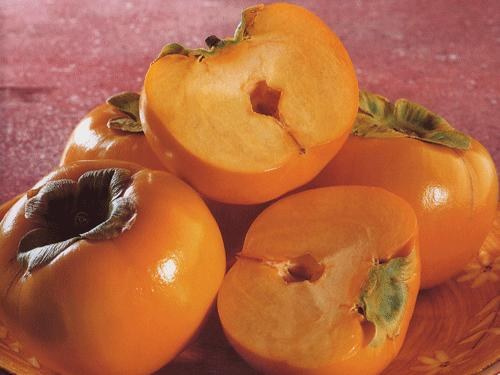Persimmon is a real storehouse of vitamins and minerals. It not only delights the most exquisite taste, but also beneficial to health. This berry improves the functioning of the brain, thyroid gland, helps with atherosclerosis. Persimmon rich in vitamin C, so its consumption helps the recovery and prevention of diseases in the period of colds.There are several varieties of persimmon: the Caucasus, Eastern and chocolate (Wren). Caucasian persimmon has strong astringent properties and average softness, its taste is much inferior to the other two types. But it is this persimmon is often sold in early winter or late fall.Persimmon East in the form of ripe soft and sweet, but if a berry is plucked unripe, it knits your mouth and leaves an unpleasant aftertaste, which is a long time. Wren was called chocolate persimmons because of its color, its ripe berries are soft, sweet and extremely fragrant.Astringent persimmon property gives great content a chemical called tannin. This substance is also called tannic acid. It possesses strong tanning properties, based on the tendency to form strong chemical bonds with the biopolymers (natural polysaccharides). Giving tannin tart, astringent taste protects the bark, leaves and ripening fruits from harmful micro-organisms and from being eaten by animals. A slight presence of tannin in the persimmon will not harm the body, since tannic acid has a beneficial effect on the digestive system and calms the nervous system. However, immature fruit should be careful, those of you who had surgery on the abdominal organs.Unripe astringent persimmon also finds application in cooking. For example, it is used in salads, and in Japan it's used to make sake.This berry can "fix" by putting a few hours in the freezer. Another way is to wrap the berries in a bag with apples. This fruit emit ethylene, which accelerates ripening of persimmon. In addition, during drying, or the dried berry also loses much of the tannin and becomes a sugary taste.
Why knit persimmon
Persimmon – sweet winter berries, which for its wonderful taste has received many names. Food of the gods, winter peach, date plum, music – all this persimmon. It is known that early persimmon knits, leaving a bad taste in my mouth due to the high content of tannic acid (tannin).

Is the advice useful?